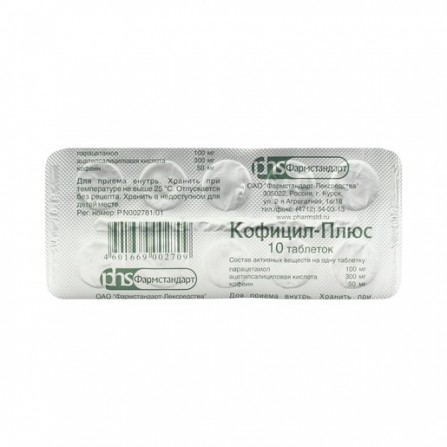Kofitsil-plus pills of 10 pieces
Condition: New product
1000 Items
Rating:
Be the first to write a review!

More info
Active ingredients
Acetylsalicylic acid + Caffeine + Paracetamol
Release form
Pills
Composition
1 tab. Acetylsalicylic acid 300 mg paracetamol 100 mg Caffeine 50 mg
Pharmacological effect
Combined medication. Acetylsalicylic acid has antipyretic and anti-inflammatory effect, reduces pain, especially caused by inflammation, and also moderately inhibits platelet aggregation and thrombosis, improves microcirculation in the inflammation. skeletal muscle, brain, heart, kidney, reduces platelet aggregation; reduces sleepiness, fatigue, increases mental and physical performance. In this combination, a small dose of caffeine practically does not have a stimulating effect on the central nervous system, but it helps normalize the vascular tone of the brain and accelerate blood flow. Paracetamol has an analgesic, antipyretic and extremely weak anti-inflammatory effect, which is due to its effect on the thermoregulation center in the hypothalamus and weak ability to inhibit prostaglandin synthesis in peripheral tissues.
Indications
Pain syndrome of mild and moderate severity (of various genesis): - headache; - migraine; - toothache; - neuralgia; - myalgia; - arthralgia; - algomenorrhea. Feverish syndrome: - with acute respiratory infections; - with influenza.
Contraindications
- hypersensitivity; - erosive and ulcerative gastrointestinal lesions (in the acute phase); - gastrointestinal bleeding; - aspirin asthma; - hemophilia; - hemorrhagic diathesis; - hypoprothrombinemia; - portal hypertension; - vitamin deficiency; - renal failure; - pregnancy ( I and III trimesters); - lactation period (breastfeeding); - glucose-6-phosphate dehydrogenase deficiency; - severe arterial hypertension; - severe CHD; - glaucoma; - increased excitability; - sleep disturbances; - surgical interventions accompanying - bleeding; - children's age (up to 15 years - the risk of Reye's syndrome in children with hyperthermia on the background of viral diseases) .C caution: gout, liver disease.
Precautionary measures
Use for violations of liver functionC Caution: Liver disease.It is used for violations of renal functionContraindicated for renal failure.Application in children Children under 15 years old can not prescribe drugs containing acetylsalicylic acid, because in the case of viral infection they can increase the risk of Reye's syndrome. Symptoms of Reye’s syndrome are prolonged vomiting, acute encephalopathy, and enlarged liver.
Use during pregnancy and lactation
Contraindicated in pregnancy (I and III trimesters), during lactation. Acetylsalicylic acid has a teratogenic effect; when applied in the first trimester of pregnancy leads to malformations - splitting of the upper palate; in trimester III - inhibition of labor (inhibition of prostaglandin synthesis), closure of the ductus arteriosus in the fetus, which causes pulmonary vascular hyperplasia and hypertension in the vessels of the pulmonary circulation. .
Dosage and administration
Inside (during or after a meal) on 1 tab. every 4 hours, with pain syndrome - 1-2 tab .; the average daily dose is 3-4 tab., the maximum daily dose is 8 tab. The course of treatment is not more than 7-10 days. The drug should not be taken more than 5 days as an analgesic and more than 3 days as an antipyretic (without prescription and follow-up of a doctor). Other dosages and regimens are prescribed by a doctor.
Side effects
Gastralgia, nausea, vomiting, hepatotoxicity, nephrotoxicity, erosive and ulcerative lesions of the gastrointestinal tract, allergic reactions (including Stevens-Johnson's syndrome, Lyell's syndrome), tachycardia, increased blood pressure, bronchospasm. For long-term use - dizziness, headache, visual disturbances , tinnitus, reduction of platelet aggregation, hypocoagulation, hemorrhagic syndrome (nosebleeds, bleeding gums, purpura, etc.), kidney damage with papillary necrosis; deafness; Reye's syndrome in children (hyperpyrexia, metabolic acidosis, disorders of the nervous system and psyche, vomiting, abnormal liver function).
Overdose
Symptoms (caused by acetylsalicylic acid): for mild intoxication - nausea, vomiting, gastralgia, dizziness, tinnitus; severe intoxication - lethargy, drowsiness, collapse, convulsions, bronchospasm, difficulty breathing, anuria, bleeding.Initially, central hyperventilation of the lungs leads to respiratory alkalosis (shortness of breath, asphyxiation, cyanosis, perspiration). As intoxication increases, progressive respiratory paralysis and dissociation of oxidative phosphorylation cause respiratory acidosis. Treatment: constant monitoring of acid-base balance and electrolyte balance; depending on the state of metabolism - the introduction of sodium bicarbonate, sodium citrate or sodium lactate. Increasing reserve alkalinity enhances the excretion of acetylsalicylic acid due to alkalization of urine.
Interaction with other drugs
Potentiates the effect of heparin, anticoagulants, reserpine, steroid hormones and hypoglycemic drugs sredstv.Odnovremennoe assignment to other NSAIDs, methotrexate increases the risk of side effektov.Umenshaet efficiency spironolactone, furosemide, antihypertensive drugs and medicines protivopodagricakih promoting excretion of uric acid. Barbiturates, rifampicin, salicylamide, antiepileptic drugs and other microsomal stimulants acidification contribute to the formation of toxic paracetamol metabolites that affect the function of the liver. Metoclopramide accelerates the absorption of paracetamol. Under the influence of paracetamol T1 / 2 chloramphenicol increases 5 times. When you take paracetamol again, it can increase the effect of anticoagulants (dicoumarin derivatives). Taking paracetamol and ethanol at the same time increases the risk of developing hepatotoxic effects. Caffeine accelerates ergotamine absorption.
special instructions
Children should not be prescribed drugs containing acetylsalicylic acid, because in the case of a viral infection they can increase the risk of Reye's syndrome. Symptoms of Reye’s syndrome are prolonged vomiting, acute encephalopathy, enlarged liver. With prolonged use of the drug, monitoring of peripheral blood and the functional state of the liver is necessary.must warn the doctor in advance about taking the drug. Patients with hypersensitivity or asthma reactions to salicylates or their derivatives acetylsalicylic acid can be prescribed only with special precautions (in terms of emergency care). Low-dose acetylsalicylic acid reduces uric acid excretion. In patients with an appropriate predisposition, this can in some cases provoke an attack of gout. During treatment, ethanol use should be abandoned (increased risk of gastrointestinal bleeding). Acetylsalicylic acid has a teratogenic effect; when applied in the first trimester of pregnancy leads to malformations - splitting of the upper palate; in trimester III - inhibition of labor (inhibition of prostaglandin synthesis), closure of the ductus arteriosus in the fetus, which causes pulmonary vascular hyperplasia and hypertension in the vessels of the pulmonary circulation. .



